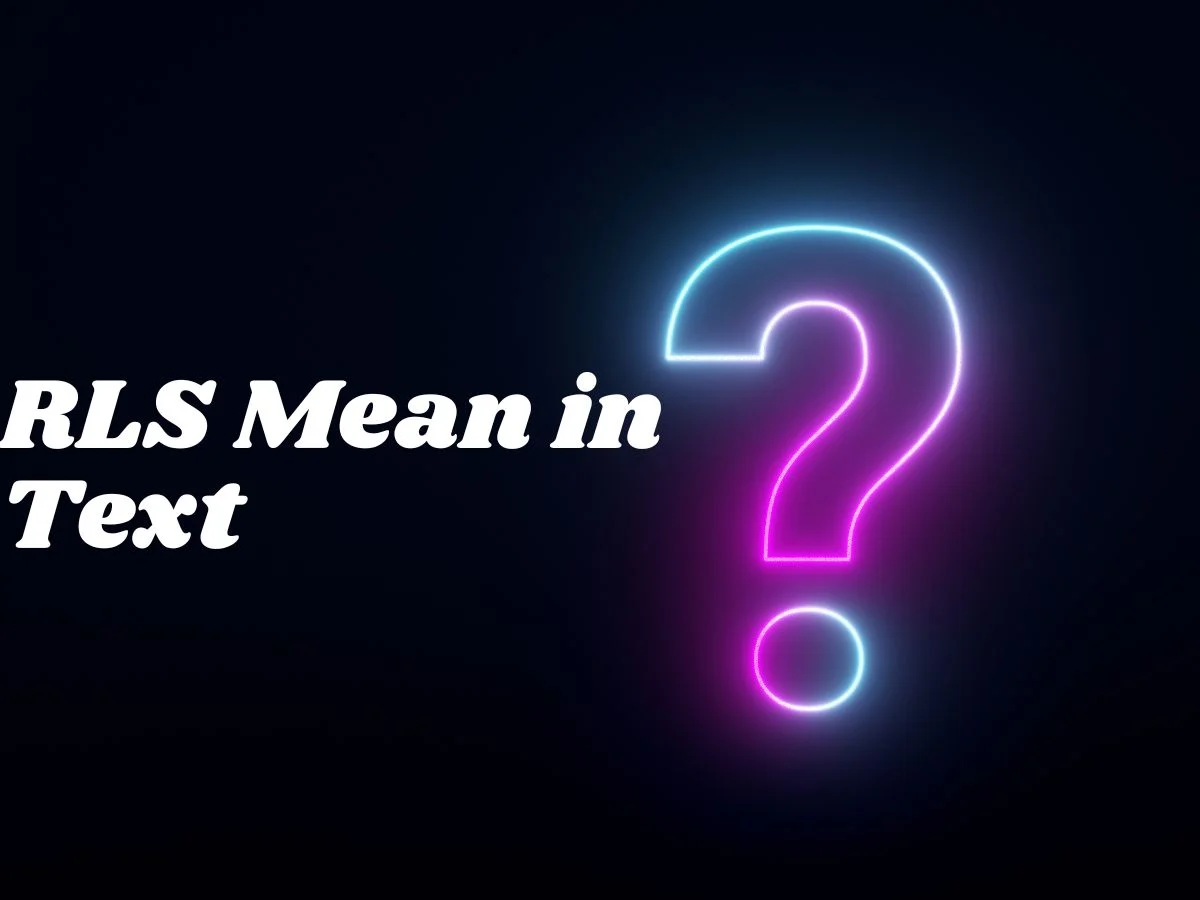In today’s fast-paced digital world, abbreviations and acronyms dominate our daily conversations, especially in texting and online communication.
One such acronym that you might have come across is RLS. While it may appear straightforward, many people are unsure what it means or how to use it properly.
Understanding these abbreviations is important because they help streamline conversations, save time, and convey emotions or concepts succinctly.
Misinterpreting or misusing acronyms like RLS can lead to confusion or missed messages, especially in casual or professional settings.
This article will explore the meaning of RLS, its origins, how it is used across different contexts, common misunderstandings, alternatives, and answers to frequently asked questions.
Whether you’re new to texting slang or looking to deepen your knowledge of digital communication, this guide will clarify everything you need to know about RLS.
Definitions & Meaning
The acronym RLS can have several meanings depending on the context, but the most common one in texting and online chats is “Real Life Sucks.”
This phrase is often used to express frustration or dissatisfaction with real-world problems, responsibilities, or challenges, especially when contrasted with online or fantasy environments that might feel more enjoyable.
For example, if someone is having a tough day at work or school, they might text a friend:
“RLS today, just want to chill and forget everything.”
Aside from this common usage, RLS also refers to Restless Legs Syndrome in a medical context, a neurological condition characterized by an uncontrollable urge to move the legs.
However, this meaning is generally not relevant in casual texting unless the conversation specifically relates to health topics.
In summary, when you see RLS in text messages or social media, it usually conveys the sentiment of frustration with real life or unpleasant circumstances.
Origins & History
The abbreviation RLS as “Real Life Sucks” likely emerged alongside the rise of internet chat rooms and instant messaging in the late 1990s and early 2000s.
During this time, online communication favored quick, efficient language, resulting in the creation of many acronyms and shorthand terms to save typing time and convey emotions rapidly.
As digital communities flourished, users frequently contrasted their sometimes dull or stressful real lives with the exciting, creative, or supportive online environments they engaged with.
“RLS” succinctly captured this feeling, becoming a popular expression of dissatisfaction or escapism.
While the medical term Restless Legs Syndrome has been known since the 17th century, its abbreviation RLS in medical texts only became widespread with advances in neurology and patient advocacy in the 20th century.
Today, the slang usage of RLS remains popular in online chats, texting, and social media platforms, reflecting the ongoing blending of real-world struggles and digital interactions.
Usage in Different Contexts
Social Media and Texting
In social media platforms like Twitter, Instagram, or TikTok, RLS is often used humorously or sarcastically to comment on everyday struggles. For instance:
“Got stuck in traffic for two hours. #RLS”
It’s a quick way to express annoyance without going into detail.
In texting, RLS can be a shorthand way to share how one feels, especially among close friends or younger audiences familiar with internet slang.
Professional Settings
Using RLS in professional or formal communication is generally discouraged because it may seem unprofessional or unclear.
Instead, people tend to express frustration or difficulties with more formal language.
However, in informal work chats or internal messaging platforms where colleagues know each other well, it might be used sparingly to build camaraderie or lighten the mood.
Pop Culture
Sometimes RLS appears in pop culture references, like memes or online forums, where people bond over shared life frustrations.
It has also been used in song lyrics or social commentary highlighting the contrast between idealized online lives and challenging real-life situations.
Common Misunderstandings & Clarifications
Many people confuse RLS with other similar acronyms or don’t realize it has multiple meanings:
- Restless Legs Syndrome: Some may mistake casual usage of RLS for the medical condition, which can cause confusion in health discussions.
- Misreading as “RL” or “RLL”: RL is often shorthand for “Real Life” without the negative connotation. Adding the “S” changes the meaning to express frustration.
- Assuming it’s a positive phrase: Since it’s used to vent or complain, RLS is generally negative and not an expression of something good.
- Not understanding context: Without context, some may not realize that RLS refers to life frustrations, which can lead to misinterpretation.
Clarifying these points ensures smoother communication and reduces misunderstandings.
Alternatives & Synonyms
If you want to express similar feelings without using RLS, here are some alternatives and synonyms:
- Real life is tough
- Life sucks
- Life’s a drag
- This day is rough
- Feeling overwhelmed
- IRL sucks (IRL = In Real Life)
These alternatives vary in tone, from casual to slightly more formal, and can be adapted based on your audience.
Frequently Asked Questions (FAQ)
1. What does RLS stand for in texting?
RLS usually means “Real Life Sucks,” used to express frustration with everyday life.
2. Is RLS a medical term?
Yes, in medicine, RLS stands for Restless Legs Syndrome, a neurological disorder.
3. Can I use RLS in professional communication?
It’s best avoided in formal settings but may be used informally among colleagues.
4. Is RLS positive or negative?
RLS generally conveys a negative sentiment about real-life difficulties.
5. How do I respond if someone texts me RLS?
You can show empathy by acknowledging their feelings, e.g., “Sorry to hear that, hope things get better!”
6. Is RLS commonly understood?
Among younger audiences and online communities, yes; others might need explanation.
7. Are there similar acronyms to RLS?
Yes, acronyms like IRL (In Real Life) or FML (F*** My Life) convey related meanings but differ in tone.
Conclusion
The acronym RLS serves as a concise way to communicate frustration or dissatisfaction with real life, especially in digital conversations.
Understanding its meaning, origins, and appropriate contexts can help you navigate online chats and social media with ease.
While it’s a casual and sometimes humorous expression, knowing when and where to use RLS is key to avoiding misunderstandings.
Whether you encounter it in text messages, social media posts, or informal conversations, RLS reflects a common sentiment many people share in balancing the challenges of the real world with their online lives.
As language continues to evolve with technology, being aware of such acronyms enhances both your communication skills and cultural literacy.









